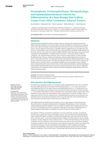 August 2022 in “IARS international research journal”
August 2022 in “IARS international research journal” The document concludes that drug repurposing, which is reusing known medicines for new illnesses, can provide faster, cheaper treatment options for various serious diseases, including cancer, COVID-19, and rare diseases.
127 citations,
August 2016 in “The oncologist” Understanding and managing side effects of hedgehog pathway inhibitors can improve treatment for advanced basal cell carcinoma.
101 citations,
August 2008 in “Mayo Clinic Proceedings” PAD is common but often missed, needing lifestyle changes and medication for better outcomes.
27 citations,
August 2008 in “Mayo Clinic proceedings” Early recognition and treatment of Peripheral Arterial Disease is crucial to improve survival and health outcomes.
4 citations,
September 2023 in “Nutrients” Managing diabetes can lead to eating disorders, and eating disorders can make diabetes harder to control.
 2 citations,
May 2023 in “Life”
2 citations,
May 2023 in “Life” Plumbagin may help protect cells, reduce inflammation, and has potential for treating various diseases, but more research is needed.
2 citations,
March 2022 in “Indian Journal of Psychiatry/Indian journal of psychiatry” The conclusion is that careful management of both psychiatric and skin conditions is crucial for HIV patients, using medication and interdisciplinary approaches.
 138 citations,
October 2012 in “Behavioral Ecology”
138 citations,
October 2012 in “Behavioral Ecology” Masculine facial features may not reliably indicate heritable health, and more research is needed.
 62 citations,
February 2011 in “Expert review of dermatology”
62 citations,
February 2011 in “Expert review of dermatology” Scalp cooling can reduce chemotherapy-induced hair loss and should be available in all hospitals.
 27 citations,
January 1990 in “Child Psychiatry & Human Development”
27 citations,
January 1990 in “Child Psychiatry & Human Development” The document concludes that supportive home environments and addressing parent-child interactions can effectively treat trichotillomania in children.
 15 citations,
October 2012 in “Journal of circadian rhythms”
15 citations,
October 2012 in “Journal of circadian rhythms” RNA from horse hair follicles can track circadian rhythms non-invasively.
 60 citations,
October 2005 in “Experimental Dermatology”
60 citations,
October 2005 in “Experimental Dermatology” Zinc can both inhibit and stimulate mouse hair growth, and might help recover hair after chemotherapy.
 10 citations,
July 2021 in “International Journal of Rheumatic Diseases”
10 citations,
July 2021 in “International Journal of Rheumatic Diseases” Lupus patients' body image issues significantly affect their mental health and need more support.
 8 citations,
September 2016 in “Pediatric dermatology”
8 citations,
September 2016 in “Pediatric dermatology” People with Mucopolysaccharidoses often have skin problems like thick skin and extra hair, and recognizing these can help diagnose and treat the condition early.
 6 citations,
January 2011 in “Springer eBooks”
6 citations,
January 2011 in “Springer eBooks” Nutrition is important for skin health, and changing diet can help prevent and treat skin diseases.
 4 citations,
November 2016 in “Pediatric Clinics of North America”
4 citations,
November 2016 in “Pediatric Clinics of North America” The document explains the difficulty in diagnosing and treating brain diseases caused by the immune system and stresses the need for quick and accurate tests.
 1 citations,
April 2018 in “Sleep”
1 citations,
April 2018 in “Sleep” Finasteride increases risk of sleep apnea and insomnia.
 December 2023 in “Research Square (Research Square)”
December 2023 in “Research Square (Research Square)” People with Down syndrome have higher rates of certain immune-related conditions and need special medical attention.
 66 citations,
August 2001 in “Experimental Dermatology”
66 citations,
August 2001 in “Experimental Dermatology” Human hair follicle cells can grow hair when put into mouse skin if they stay in contact with mouse cells.
 41 citations,
March 1992 in “Archives of Dermatology”
41 citations,
March 1992 in “Archives of Dermatology” The review suggests that understanding and treating the psychological aspect of skin disorders is important and calls for more collaboration in this field.
 30 citations,
June 2006 in “British journal of dermatology/British journal of dermatology, Supplement”
30 citations,
June 2006 in “British journal of dermatology/British journal of dermatology, Supplement” Oral zinc sulphate reduces dark hair color in mice.
 24 citations,
May 2012 in “International Journal of Dermatology”
24 citations,
May 2012 in “International Journal of Dermatology” The document concludes that eyelash trichomegaly, which is the abnormal growth of eyelashes, can be present from birth, caused by diseases, or result from certain medications.
 22 citations,
August 2014 in “Clinical endocrinology”
22 citations,
August 2014 in “Clinical endocrinology” Taking finasteride for benign prostate hyperplasia may increase the risk of osteoporosis, especially at higher doses.
 16 citations,
December 2007 in “Expert Review of Pharmacoeconomics & Outcomes Research”
16 citations,
December 2007 in “Expert Review of Pharmacoeconomics & Outcomes Research” PCOS lowers quality of life, causing issues like obesity, infertility, and menstrual problems.
 12 citations,
December 2016 in “International journal of nursing practice”
12 citations,
December 2016 in “International journal of nursing practice” Puerto Rican children with cancer often experience symptoms like irritability, nausea, and hair loss, and need better education and continuous symptom management.
 11 citations,
August 2019 in “The Journal of Sexual Medicine”
11 citations,
August 2019 in “The Journal of Sexual Medicine” Women with nonclassic congenital adrenal hyperplasia experience more sexual dysfunction and distress.
 8 citations,
July 2014 in “General and Comparative Endocrinology”
8 citations,
July 2014 in “General and Comparative Endocrinology” Finasteride affects frog testes by increasing testosterone, decreasing 5α-DHT, and impacting genes related to reproduction and other functions.
 5 citations,
August 2020 in “Curēus”
5 citations,
August 2020 in “Curēus” The document concludes that recent studies help tell apart desmoplastic trichoepitheliomas from other skin tumors, but more research is needed for clear differentiation.
 1 citations,
July 2015 in “Cambridge University Press eBooks”
1 citations,
July 2015 in “Cambridge University Press eBooks” Testosterone therapy can improve sexual function in women but long-term safety is unclear.
 December 2023 in “Research in pharmacy”
December 2023 in “Research in pharmacy” Phytotherapeutic compounds and supplements can help manage Polycystic Ovarian Syndrome (PCOS).
























